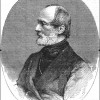
Marjorie Stone, “Joseph Mazzini, English Writers, and the Post Office Espionage Scandal: Politics, Privacy, and Twenty-First Century Parallels”
In 1844, an English radical MP affiliated with the Chartist movement petitioned the House of Commons, charging that Sir James Graham, Secretary of State for the Home Office, had secretly authorized the opening of the letters of exiled Italian nationalist and resident of London, Joseph Mazzini, spying upon their contents. The ensuing Post Office espionage scandal is a pivotal event in British and European history, represented—like Mazzini himself—from conflicting perspectives and shaping a host of subsequent developments. It provoked “anti-Graham” envelopes and parodies in Punch, intensified British sympathy for the Italian liberation and unification movement for which Mazzini was the principal theorist, and influenced British policy towards the 1847-49 revolutions in Italian states struggling for independence from Austrian overlords and autocratic Bourbon kings. The scandal and the networks it forged also shaped British party politics, Chartist international alliances, and emerging conceptions of rights to privacy and limits on state surveillance. Mazzini, revered as an apostle by many, was viewed as a dangerous subversive by many others, including the Pope and Prince Klemens von Metternich, Foreign Secretary to the Austrian Empire, later one of Henry Kissinger’s diplomatic models. As the scandal unfolded, evidence indicated that Graham and the Foreign Secretary Lord Aberdeen shared information from Mazzini’s letters with the Austrians, linking British espionage to the execution of the Bandiera brothers, Italian revolutionaries, in Naples in July 1844. This essay surveys diverse responses to Mazzini and the literary and cultural as well as the political repercussions of the 1844 scandal. Prominent English writers, notably Thomas Carlyle, came to Mazzini’s defence, especially indignant over violations of privacy, while others—including Robert Browning, Elizabeth Barrett Browning, George Meredith, Algernon Charles Swinburne, and George Eliot—went on to write works influenced by the charismatic, controversial Italian nationalist. An epilogue notes some of the 1844 event’s parallels with current controversies over communications hacking (WikiLeaks, the News of the World phone hacking) and appropriate limits on state secrecy and surveillance in the wake of 9/11, 7/7, anti-terrorism legislation, and the “rendition” of information and/or persons such as Canadian-Syrian Maher Arar to oppressive regimes by democratic countries.
